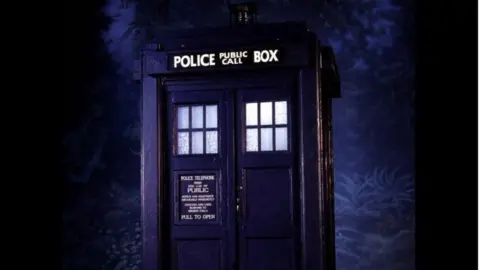Children to study Doctor Who theme tune in BBC Ten Pieces
 BBC
BBCSchoolchildren will get to investigate the intricacies of the Doctor Who theme music as part of a BBC project to engage kids with classical music.
Delia Derbyshire's sweeping electronic score is just one of the works featured in this year's Ten Pieces season.
It's joined by Gershwin's Rhapsody in Blue and a newly-commissioned work by film composer Hans Zimmer.
The aim of the season is to illustrate that classical music is a "living, ever-evolving art form".
The 10 chosen works span every era of classical music, based around the theme of "trailblazers".
Among the composers being showcased are Florence Price, who was the first African-American woman to be recognised as a symphonic composer; and Polish musician Grażyna Bacewicz, who wrote defiant, subversive music in occupied Warsaw during World War Two.
The full 10 works in this year's Ten Pieces are:
- Hans Zimmer - Earth
- George Gershwin - Rhapsody in Blue
- Ravi Shankar - Symphony, Finale
- Delia Derbyshire - Doctor Who Theme
- Antonio Vivaldi - Winter from The Four Seasons
- Grażyna Bacewicz - Overture
- Steve Reich - Music for 18 Musicians
- Heitor Villa-Lobos - Bachianas brasileiras No 2, Little Train of the Caipira (finale)
- Florence Price - Symphony No. 1 in E Minor (3rd movement)
- Johannes Brahms - Hungarian Dance No 5
Zimmer, whose film scores include The Lion King, True Romance, The Dark Knight and Gladiator, is writing a brand new theme for the season - in recognition of the fact most people's first exposure to orchestral music comes in the cinema.
"I am honoured to have been asked to create a piece for BBC Ten Pieces Trailblazers series," he said.
"At the heart of my new piece, Earth is the sound of young voices who underlie the music. Set against the backdrop of our magnificent, precious planet, I hope it will be the perfect springboard to inspire creativity in classrooms across the UK."
Since it first launched in 2014, the Ten Pieces project has been rolled out to more than 10,000 schools, reaching five million people across the UK.
The new season, like the ones before it, will culminate in a concert at the BBC Proms, where children who have studied the works in the classroom can see them played by a real-life orchestra.
How the Doctor Who theme changed music
The Doctor Who theme is the Bohemian Rhapsody of TV music - innovative, audacious and endlessly covered by amateurs and professionals alike.
The music itself was written by Ron Grainer, but it was Delia Derbyshire who took his notes and created a futuristic, otherworldly arrangement.
It was 1963, so Derbyshire and her assistant Dick Mills didn't have access to anything like a synthesisers. Instead, they painstakingly created each note by cutting up and splicing together bits of analogue tape, then speeding them up and slowing them down.
The famous bassline was a recording of a single plucked string, whose pitch was altered by something called a "wobbulator".
Onto that, she layered white noise and strange test tones, making it sound as if the music had been beamed in from another dimension.
The story goes that when Derbyshire played the music back to Grainer, he asked: "Did I write that?" To which she replied: "Most of it."
Over the years, the song has been tweaked, nipped, tucked, embellished and orchestrated - but it has never lost the essence of Derbyshire's original creation.
And while BBC policy dictated that Grainer got full credit for the music (he strenuously objected), Derbyshire has come to be recognised as a pioneer of electronic music and sonic manipulation.
Artists including Aphex Twin, Orbital and The KLF have called her an influence, while her techniques were borrowed by everyone from The Beatles to Pink Floyd.

Follow us on Facebook, on Twitter @BBCNewsEnts, or on Instagram at bbcnewsents. If you have a story suggestion email [email protected].

